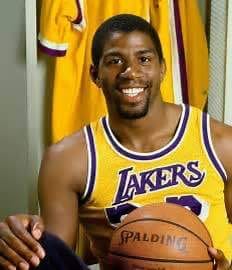Earvin Johnson Jr. grew up in Lansing, Michigan, with nine brothers and sisters. His father worked in a General Motors plant; his mother was a school custodian. Young Johnson sang on street corners with his buddies and played basketball. “Junior,” or “June Bug” as his neighbors called him, was on the court by 7:30 many mornings. Johnson’s basketball career began at Michigan State University, where he led his team to the N. C. A. A. Championship game victory and was named Most Valuable Player in the N. C. A. A. Final Four.
In 1979, made him available for the professional draft and was the first player picked by the Los Angeles Lakers. He was an All-Star as a rookie and helped guide the Lakers to their first championship since 1972. During the 1980s, Johnson orchestrated the now-famous Lakers offense known as “Showtime,” and the team became one of the best in the game. Over the course of his 12 N.B.A. seasons, Johnson left a trail of records that marked him as one of the best players in history. His quick smile and sociable personality made him a favorite among fans and advertisers.
On November 7, 1991, Johnson announced that he had tested positive for H.I.V. during a routine physical exam. He also announced that, he was retiring from the N.B.A. on the advice of his physician. He was still elected to the 1992-93 All-Star team and was a member of the 1992 U. S. Olympic Basketball “Dream Team.” He became part owner of the Lakers team and even stepped in as head coach for the last 16 games of the 1993-94 season. He also became very active in charitable causes, including the United States National AIDS Committee, the United Negro College Fund, the Muscular Dystrophy Association, the American Heart Association and the Urban League. To improve the quality of life in inner-city neighborhoods, he built a chain of state-of-the-art multiplex movie theaters, the Magic Johnson Theaters. In 1996, Johnson stunned the world by returning to the N.B.A.
On January 29, 1996, he played his first N.B.A. game in five years. His return lit a fire under the slumping Lakers, and they won 29 of their last 40 games, earning the fourth seed in the Western Conference playoffs. After a first-round defeat, Johnson decided once again to retire. The following year, Johnson signed a deal with Twentieth TV to develop, produce, and host his own late-night talk show, “The Magic Hour.”
Married (to Cookie) with two children, Magic Johnson remains very busy in worldwide business and humanitarian causes.
Written by Dianne Washington

